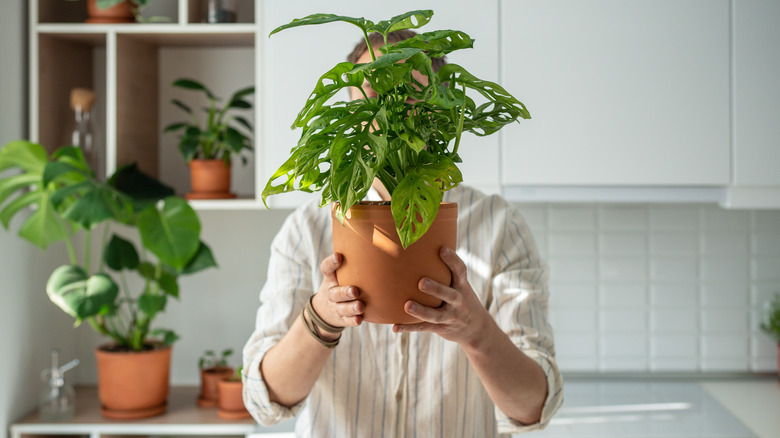Why Some Gardeners Swear By Sniffing Their Houseplant Soil (& Should You Try It?)
Despite truly loving greenery and actively choosing the easiest houseplants anyone can keep alive, many of us still seem to struggle when it comes to indoor farming. The problem, it seems, could lie with the condition of your soil. And sticking your nose into your houseplants could be the solution, or at least one among many soil health tests. Dirt that smells like rotten eggs or mildew indicates poor plant health, while the soil surrounding thriving plants smells pleasantly loamy. In other words, the answer to the question of whether or not you should smell your houseplant soil is a resounding yes. Houseplant owners absolutely should sniff the dirt in planters and even outside in their garden regularly to ensure that it's healthy.
You know the distinctive earthy scent of cooked beetroot or the pleasant odor in the air after a rain shower? If the smell of your houseplant soil reminds you of either of these scenarios, you're doing something right. Since 1965, the odor of healthy dirt has actually had a name: geosmin. It's the collective name for a sweetly-scented compound that's released by beneficial microorganisms in the soil, mostly bacterium but also some fungi. Therefore, if your houseplants' soil has a pleasant smell, this indicates that the soil is benefitting the plant. On the other hand, if it has a bad odor, this is an indicator that something is wrong and your plant could soon die. Smelling your plants regularly can help you ensure that they're thriving.
Bed-smelling soil problems and what to do
If your indoor plants are giving off a bad smell reminiscent of ammonia, rotten eggs, or sulfur, your plants are likely in trouble. For one thing, it's more likely the roots and soil producing the uncomfortable odors than the visible, ornamental part of the plants. Smells of this nature are most often the result of soggy soil and a lack of oxygen leading to organic matter breakdown and root rot. These offending smells are also caused by bacteria, but in this case it's water-loving anaerobic microbes that you really don't want around. A sour, metallic, or kitchen cleaner-like smell indicates something is missing from your soil biology-wise or the pH is too low. If your soil has no scent at all, it might be providing little to no nutrients to the plant.
As a gardener, your nose is a super power. Use it just as much as your other senses to diagnose problems. If you have a foul-smelling houseplant, touch the soil. Does it feel damp or wet? Carefully pull your plant out of the planter and check the roots for signs of decay — sponginess, sliminess, or visible mold. If it looks salvageable, you should change your indoor plants' soil for something more porous, like a high-quality potting soil with pumice added. Check to make sure the drainage holes aren't blocked as well. However, don't immediately trash the old soil! If possible, here are some pro tips for reusing potting soil for other plants.
